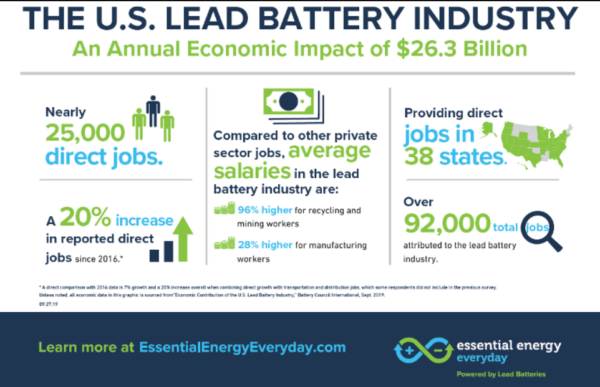The lead battery business in the United States has a remarkable $32.9 billion yearly economic effect, considerably contributing to the nation’s economic growth. According to a new report by Batteries Council International (BCI), the primary trade group for the North American battery sector, this is the case.
The study titled “Economic Contribution of the U.S. Lead Battery Industry in 2021” demonstrates that the lead battery business is vital to the U.S. economy. It has a remarkable $13.7 billion yearly impact on GDP. In addition, its members create well-paying industrial employment and technical advances that will benefit the nation for decades.
Increased employment expansion is anticipated in green industries.
Study highlights include the fact that the industry is a key source of employment development in 38 states and supports over 121,000 well-paying manufacturing jobs in each of the country’s major regions. The industry pays its employees an average annual salary of $81,000 across all lead battery industries. This exceeds the wages paid in the majority of other industries.

Roger Miksad, executive vice president of BCI, stated, “This study shows the essential role that the lead battery sector plays in sustaining the U.S. economy and delivering high-paying employment for American workers.”
Also, the U.S. lead battery business is devoted to research and development. The industry invests roughly $113 million yearly in research and development. According to Miksad, the funds subsidize battery performance and energy storage application developments.
“Our industry has made substantial investments in research and development, resulting in technological advances that currently enable a variety of green energy and transportation applications. This creates even more prospects for the establishment of long-term jobs in contemporary manufacturing.”
The industry is Crucial for Green Energy Storage
The sector also plays a vital role in assisting the United States to accomplish its aggressive decarbonization objectives. For the electrification of transportation and renewable energy, advanced lead battery technology is a key source of energy storage. At least half of the world’s energy storage requirements, including renewable energy, are met by the U.S. lead battery sector.
In addition, practically all hybrid and full-electric cars need lead batteries for essential tasks. Lead batteries can provide a very sustainable, domestically derived energy storage solution to increase the availability of quick charging for electric vehicles. Start-stop technology offered by lead batteries is utilized by hybrids and other HEVs to cut greenhouse gas emissions in the United States by 6,7 million tons yearly.
Industry Designs Circular Economy for American Producers
The industry brings substantial economic advantages. It has a developed domestic infrastructure that has become a model for closed-loop manufacturing unmatched by any other nation.
“Our study emphasizes the significance of the lead battery industry’s domestic infrastructure, which serves as an example for a successful circular economy and safeguards American employment,” said Miksad. Our industry’s resiliency, scalability, and independence from external interference contribute to national security and provide substantial economic advantages.
With an annual production capacity of more than 165 GWh in the U.S. and more than 206 GWh in North America, the lead battery industry’s domestic infrastructure provides a significant supply of domestically supplied energy storage.
The report also examines the consequences of COVID-19 on supply chains, the pandemic’s effects on lead battery uses, and the repercussions on BCI member firms.

